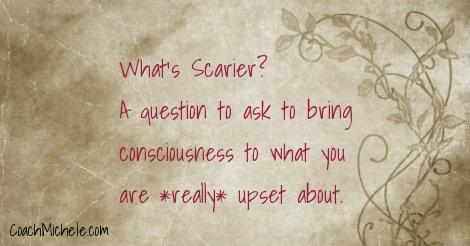So many times when communication seems painful, there is an obscuring of the truth.
A dancing about with layer upon layer of defense mechanisms and egoic beliefs that SEEM like something important to talk about, consider, or be upset about, but are actually orders of magnitude away from the most important truth.
There are many truths that are objectively scary. We will all die. Anyone could die at any moment. There are people and animals suffering greatly upon this Earth. There are real things that could be considered scary.
However when we get to a scary truth, and are able to speak it (or think it) without our personal annihilation or crumbling to the ground, we bring a measure of peace to the matter. (Advanced: The more love we can have in our heart when we speak it, the more peace we bring.)
“Following the Fear” can help you cut through illusion and get to the true heart of certain matters, in a way that increases the health and consciousness of a situation.
This might be somewhat counter-intuitive, or even something we may have trained ourselves to avoid…Due a fearful interpretation of “thinking positive”, we may fear thinking about anything that we deem “negative”, which is quite often just things that we fear.
So what do I mean by following the fear? Let’s play this out.
I’m watching a Byron Katie video and a daughter is complaining that her mom “shamed” her when she pointed out that she could have died when she ignored her appendicitis pain. Of course, The Work with Byron Katie completely helped this young woman get to the truths of this situation. I just want to offer an alternative approach that can shed a different kind of light.
So, the complaint is…
“My mom shamed me about almost dying.”
Question: What’s scarier? A person saying something to you? Or actually dying?
Answer (maybe): “Well, actually, dying is a bigger deal than someone saying something, so I guess I’m actually more upset about dying than what my mom said. I guess I’m scared of dying.” This is most likely a truthful thought, that when spoken and acknowledged, brings a level of peace, and highlights the irrelevance of the part that was previously the focus (somebody said something about something scary and I didn’t like how they said it.)
Let’s see if we can apply this idea to some other common upsets:
“My sister shouldn’t have called me fat.” What’s scarier? Someone saying something about something that could be true? Or the possible fact that you actually are overweight? (Please note that I am making no judgements about the “truths” we uncover.)
“I’m not so upset that my husband had an affair, I’m just upset that he lied about it.” Really? Your husband lying to protect your feelings is a more scary thing than him passionately loving and touching another woman? Are you sure about that?
“I’m so mad at my siblings for not acknowledging what happened to us when we were little.” What’s scarier? What’s a bigger deal? Children getting abused, or adults being in denial? I personally think that children getting abused is a scarier and more upsetting thing than adults being in denial. I think the real work is coming to some sort of peace and healing around the abuse itself, not its psycho-social reverberations.
The whole point of the “what’s scarier” and “following the fear” technique is to get to the real “problem” in any situation in a faster and more conscious way.
Then, consciousness can finally do it’s job: Bring love, light and healing.


